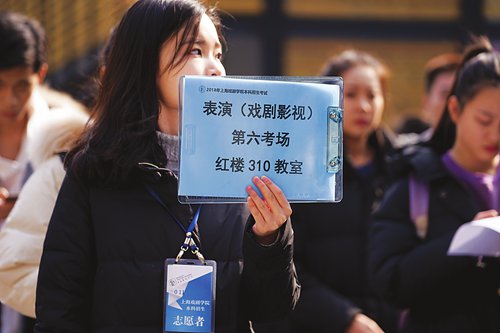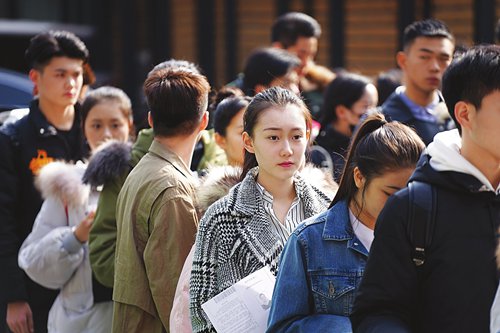
From the People’s Daily app.
This is Story in the Story.
Behind every actor who appears in a commercial, feature film or television drama, there is a talent agent.
Today, China is home to 200 talent agencies.
Internet streaming programs have increased the demand for new stars. For the last season of “Idol Producer,” talent agencies across the country sent 2,000 new hopefuls to audition for less than 10 spots.
Navigating the road to stardom is not easy and young students desperate for fame and fortune often overlook the business aspect of showbusiness.
Fortunately, performing arts schools are taking a more pro-active role in protecting young artists as the country’s film and television industry continues on its path of healthy development.
Today’s Story in the Story looks at China’s emerging talent agency industry and what goes on behind the scenes before aspiring actors can become the country’s next big thing.

(Photos:Yang Hui and Chen Xia/GT)
"Almost all freshmen sign with a talent agency," said a group of professors at the Shanghai Theatre Academy. And not only students who major in acting, but also those who study dance, opera, musical performance, and hosting, they added.
The students often spend more time meeting with agencies than they do studying.
The process seems fairly simple at first. Students sign a contract with an acting company that details payment and other rights.
The actors are obligated to perform in various Internet programs along with any outside production work required by the company.
Exceptionally handsome and pretty students are targeted by acting companies ahead of the school’s official enrollment season.
"Though signing or not is a personal choice, I vehemently say no to it," said Wang Luoyong, the first Chinese actor to perform Broadway and the current director of the music department at STA.
"There are countless bad examples. Some profit-oriented acting companies not only damage the respect students have for their artistic abilities, but also destroy their study habits," he said.
Some agencies have their clients sign contracts that include installment payments, so when a performance ends, the young actors are short changed.
"It is a significant cost to engage in a lawsuit and safeguard their rights. Hiding gimmicks in a contract and other unfair treatments are hidden rules in this industry," said STA professor Li Zhenlin, who often speaks up for young students who do not know any better.
Students will sign multi-year contracts that come with exorbitant buy-out options making it hard for them to switch agencies during the early stages of their careers.

(Photos:Yang Hui and Chen Xia/GT)
Liu Tianchi, an acting teacher at CAD said, "Half of my students are outside shooting and not attending classes."
“Talent agents in China are not a new thing,” said He Yan, dean of the acting department at STA. His former students Li Bingbing and Ren Quan, were thrust into the limelight with the help of Wang Jinghua, one of China’s first talent agents.
"Professional and responsible agents are a blessing for actors and actresses. They take good care of you and more importantly, provide insightful opinions on your career development."
He perceived that there are a significant number of unprofessional and unscrupulous agencies which are profit-centered and use students as a wealth-producing tool, ignoring and not knowing how to plan their future.
Talent agent Jiang Zheng said there are many agents out there who ask students and their families to pay upfront fees in the name of training.
As he explained, the agencies have the same competing strategy of “rapid acquisitions.”
"They cast a wide net to grab hundreds of freshmen. How can they take care of everyone at the same time? Worst of all, many are solely driven by money and do not have any experience in the showbiz industry," he said.
Huang Changyong, dean of STA, said his school is actively planning to work out strategies and set up rules strictly controlling the time students spend outside shooting or doing commercial performances.
Meanwhile, the school might also make a three-party agreement to safeguard the interest of its students to the greatest extent.
"I hope students can realize those pitfalls in this situation and focus more on their study in school,"
(Produced by Nancy Yan Xu, Lance Crayon, Brian Lowe and Da Hang. Music by: bensound.com. Text from Global Times.)


